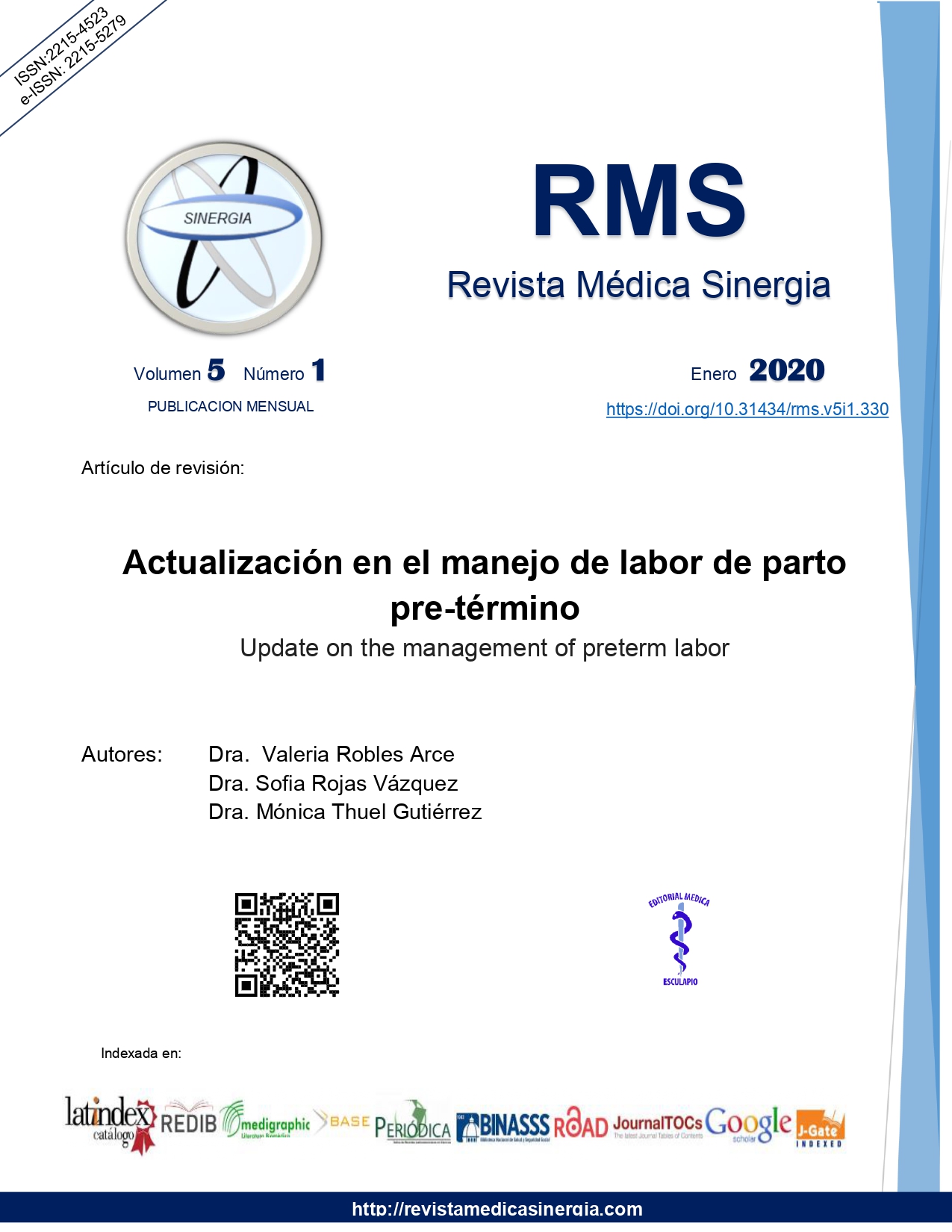Resumen
La labor de parto pre-término es una de las principales causas de morbimortalidad neonatal y una de las causas más frecuentes de hospitalización durante el embarazo. Su diagnóstico se basa en la presencia de contracciones uterinas regulares acompañados de cambios cervicales antes de las 37 semanas de gestación. Recientemente se utilizan medidas objetivas, como la medición de longitud cervical por ultrasonido transvaginal y la fibronectina fetal, para su diagnóstico, ya que este es clave para el éxito del manejo. El propósito del tratamiento de la labor de parto pre-término es retrasar el parto durante al menos 48 horas, para poder suministrar corticosteroides, que son los únicos medicamentos que han demostrado mejorar la supervivencia fetal, y trasladar a la paciente a un centro médico especializado. El tratamiento tocolítico se reserva para mujeres en quienes el retraso en el parto va a beneficiar al neonato y la escogencia de este se basa en las contraindicaciones fetales, maternas y los efectos secundarios de cada uno de los agentes.
Palabras clave
Citas
Romero R, Dey SK, Fisher SJ. Preterm labor: One syndrome, many causes. Science. 2014 08 14;345(6198):760-765. https://doi.org/10.1126/science.1251816
Practice Bulletin No. 171. Obstetrics & Gynecology. 2016 Oct;128(4):e155-e164. https://doi.org/10.1097/aog.0000000000001711
Sen C. Preterm labor and preterm birth. Journal of Perinatal Medicine. 2017 01 01;45(8). https://doi.org/10.1515/jpm-2017-0298
Patel SS, Ludmir J. Drugs for the Treatment and Prevention of Preterm Labor. Clinics in Perinatology. 2019 06;46(2):159-172. https://doi.org/10.1016/j.clp.2019.02.001
Rundell K, Panchal B. Preterm Labor: Prevention and Management. American Family Physician. 2017;95(6):367-372.
Berghella V, Navathe R. Tocolysis for Acute Preterm Labor: Where Have We Been, Where Are We Now, and Where are We Going?. American Journal of Perinatology. 2016 01 25;33(03):229-235. https://doi.org/10.1055/s-0035-1571147
Berghella V, Palacio M, Ness A, Alfirevic Z, Nicolaides KH, Saccone G. Cervical length screening for prevention of preterm birth in singleton pregnancy with threatened preterm labor: systematic review and meta-analysis of randomized controlled trials using individual patient-level data. Ultrasound in Obstetrics & Gynecology. 2017 02 08;49(3):322-329. https://doi.org/10.1002/uog.17388
Navathe R, Berghella V. Progesterone as a tocolytic agent for preterm labor. Current Opinion in Obstetrics and Gynecology. 2016 Dec;28(6):464-469. https://doi.org/10.1097/gco.0000000000000327
Koullali B, Oudijk M, Nijman T, Mol B, Pajkrt E. Risk assessment and management to prevent preterm birth. Seminars in Fetal and Neonatal Medicine. 2016 04;21(2):80-88. https://doi.org/10.1016/j.siny.2016.01.005
Malone FD. What is New in the Management of Acute Preterm Labor?. Obstetrics & Gynecology. 2016 02;127(2):398-399. https://doi.org/10.1097/aog.0000000000001284
Vogel JP, Nardin JM, Dowswell T, West HM, Oladapo OT. Combination of tocolytic agents for inhibiting preterm labour. . Cochrane Database of Systematic Reviews. 2014 07 11;. https://doi.org/10.1002/14651858.cd006169.pub2
Neilson JP, West HM, Dowswell T. Betamimetics for inhibiting preterm labour. . Cochrane Database of Systematic Reviews. 2014 02 05;. https://doi.org/10.1002/14651858.cd004352.pub3
Flenady V, Wojcieszek AM, Papatsonis DN, Stock OM, Murray L, Jardine LA, Carbonne B. Calcium channel blockers for inhibiting preterm labour and birth. . Cochrane Database of Systematic Reviews. 2014 06 05;. https://doi.org/10.1002/14651858.cd002255.pub2
Crowther CA, Brown J, McKinlay CJ, Middleton P. Magnesium sulphate for preventing preterm birth in threatened preterm labour. . Cochrane Database of Systematic Reviews. 2014 08 15;. https://doi.org/10.1002/14651858.cd001060.pub2
Flenady V, Reinebrant HE, Liley HG, Tambimuttu EG, Papatsonis DN. Oxytocin receptor antagonists for inhibiting preterm labour. . Cochrane Database of Systematic Reviews. 2014 06 06;. https://doi.org/10.1002/14651858.cd004452.pub3
Duckitt K, Thornton S, O'Donovan OP, Dowswell T. Nitric oxide donors for treating preterm labour. . Cochrane Database of Systematic Reviews. 2014 05 08;. https://doi.org/10.1002/14651858.cd002860.pub2


